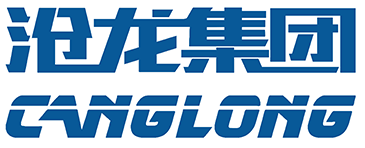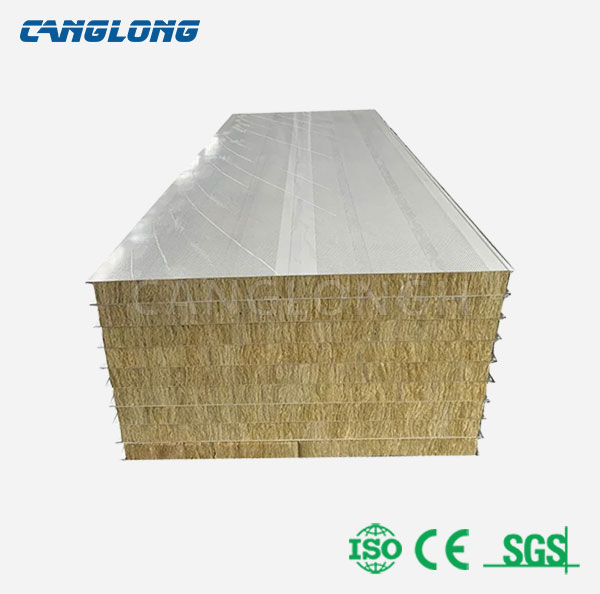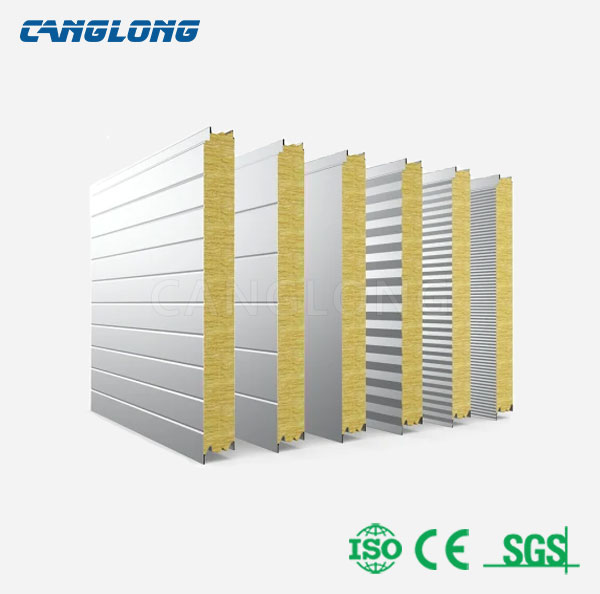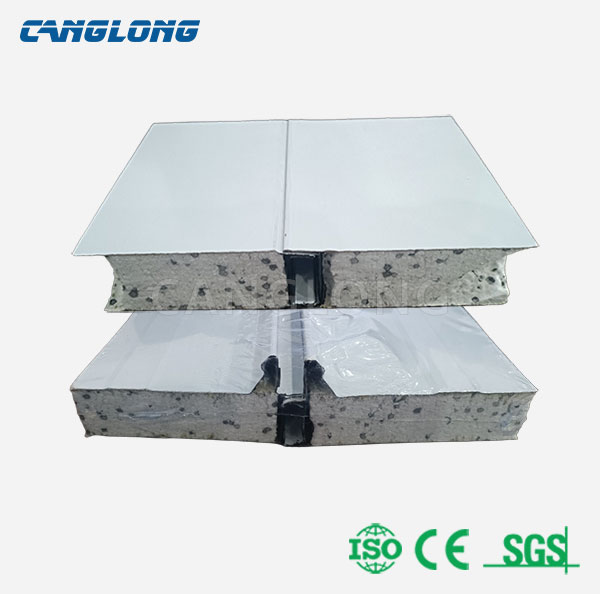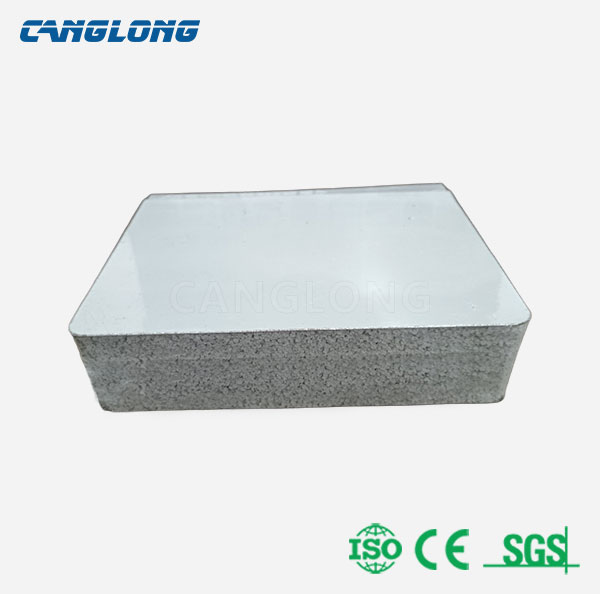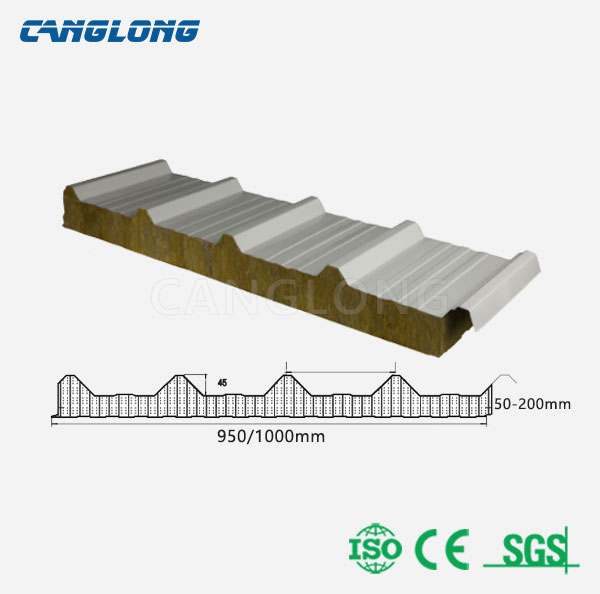
Fireproof Mineral Wool Sandwich Roof Panel
- Effective Width: 950mm/1000mm
- Profile Types: 3/4/5 ribs
- Core Material Density: 80-120kg/m³
- Metal Sheet Thickness: 0.4mm to 0.8mm
- Color of Steel Plate: White/Offwhite/Blue or Customized
- Core Thickness: 50/75/100/150/200mm
- Coating: PE/HDP/PVDF/SMF
- Plating: Hot-galvanize/Aluminium/Stainless
- Sound Insulation: ≥30db
- Flammability Rating: A
- Delivery Time: 7-15 days
- Shipping Port: Qingdao Port
- Payment: T/T, L/C, PayPal
- Service Life: ≥15 years
- Product Origin: Henan, China
Product Details
Fireproof mineral wool sandwich roof panel is advanced building materials designed to provide excellent thermal insulation, soundproofing, and fire resistance. These panels are commonly used in commercial and industrial applications, particularly where fire safety is a priority.
Fireproof mineral wool sandwich roof panels offer a reliable solution for thermal insulation, soundproofing, and fire resistance in various applications. Their robust design, energy efficiency, and safety features make them an ideal choice for modern construction needs. By understanding the features and benefits of these panels, builders and architects can effectively utilize them to enhance the safety and sustainability of their projects.
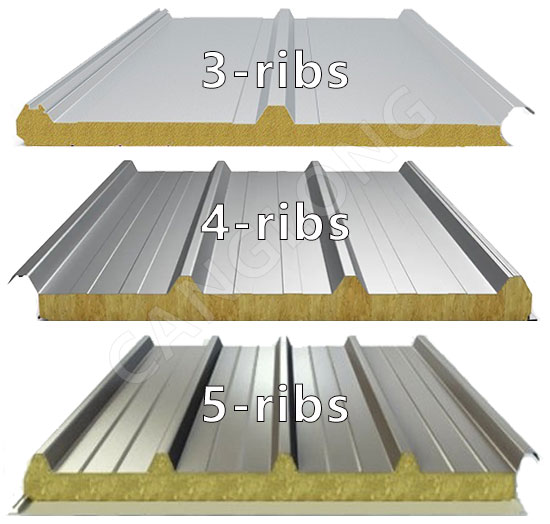
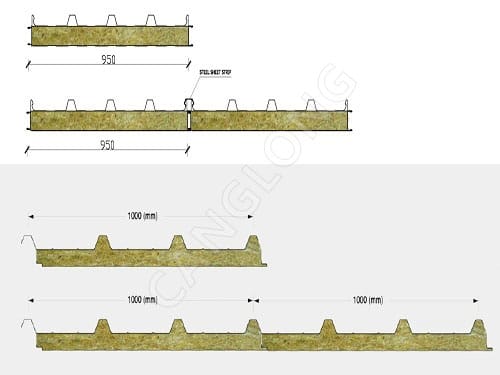

Features of fireproof mineral wool sandwich roof panel
1. Composite Structure: The panels consist of a core made from mineral wool insulation sandwiched between two outer layers, typically made of metal (such as galvanized steel or aluminum). This composite design enhances structural integrity and insulation performance.
2. Fire Resistance: Mineral wool is non-combustible, providing excellent fire resistance, which helps to prevent the spread of flames and smoke. These panels can meet stringent fire safety standards.
3. Thermal Insulation: The mineral wool core offers low thermal conductivity, typically around 0.035 to 0.045 W/m·K, ensuring effective thermal insulation that helps maintain stable internal temperatures.
4. Sound Insulation: The dense structure of mineral wool provides effective soundproofing, making these panels suitable for environments where noise reduction is essential.
5. Moisture Resistance: Mineral wool panels resist moisture absorption, helping to prevent mold growth and maintaining insulation performance over time.
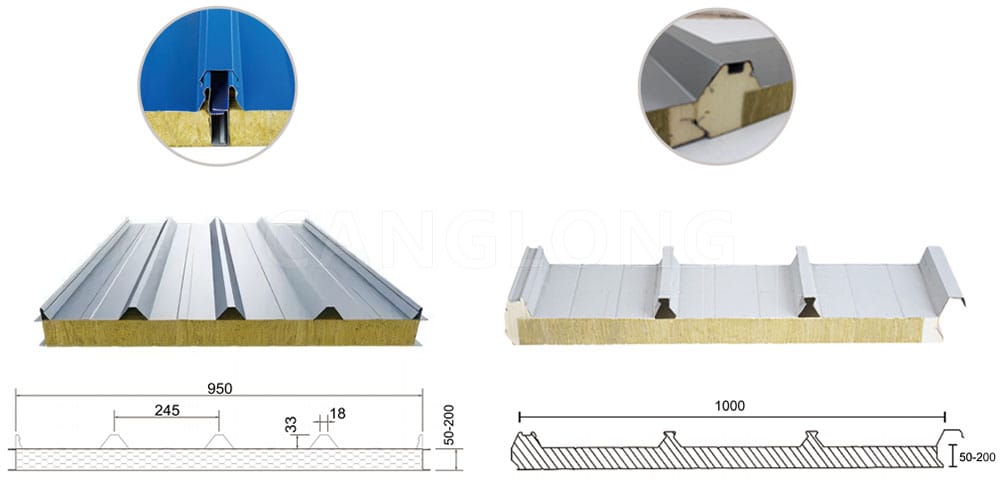
| Useful Width (mm) | 1000 | 950 |
| Rib Height (mm) | 35 | 55 |
| Rib Count | 5 | 4 |
| Sheet Type and Thickness (mm) | 0.20 – 0.80 | |
| Paint Type | Polyester, PVDF | |
| Color | RAL 9002 a | |
| Insulation Thickness (mm) – h | 50 – 60 – 75 – 80 – 100-120 | |
| Declared Thermal Conductivity (10°C) (W/mK) | ≤ 0.040 | |
| Reaction to Fire | A2-S1 | |
| Fire Resistance | REI 120* | |
Benefits of fireproof mineral wool sandwich roof panel
1. Enhanced Safety: With superior fire-resistant properties, these panels contribute significantly to the overall safety of the building, protecting occupants and assets.
2. Energy Efficiency: The excellent thermal insulation properties reduce energy consumption for heating and cooling, leading to lower utility bills.
3. Sustainability: Mineral wool is made from natural and recycled materials, making it an eco-friendly choice for construction.
4. Versatility: Available in various sizes, thicknesses, and finishes, these panels can be customized to meet specific project requirements.
5. Quick Installation: Prefabricated panels allow for rapid installation, reducing overall construction time and labor costs.
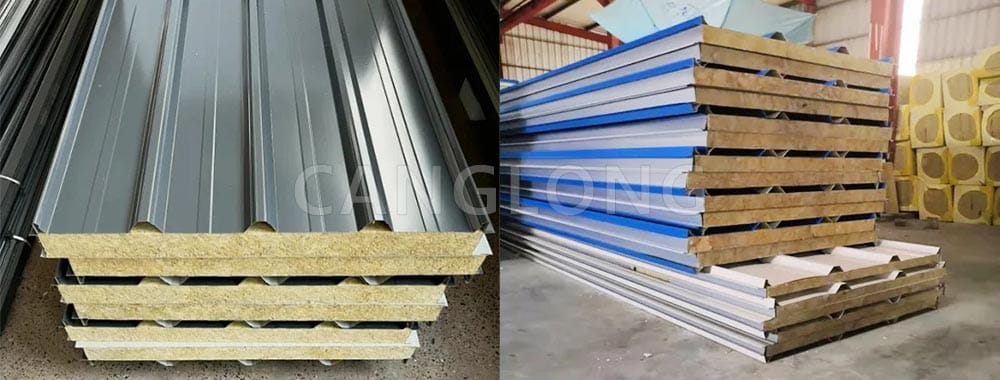
Rock Wool Insulated Sandwich Roof Panel Parameters
| Panel Thickness | Heat Conductivity (W/m2.K) | Weight(kg) | Load capacity (P=KN/M2) | 0.60 | 0.80 | 1.00 | 1.20 | 1.50 |
| 50mm | 0.75 | 15.75 | L(m) | 3.78 | 3.13 | 3.31 | 2.98 | 2.41 |
| 75mm | 0.53 | 18.68 | L(m) | 4.83 | 4.21 | 4.21 | 3.76 | 3.01 |
| 100mm | 0.41 | 21.62 | L(m) | 5.77 | 5.02 | 5.02 | 4.47 | 3.55 |
| 150mm | 0.31 | 27.51 | L(m) | 7.53 | 6.54 | 6.54 | 5.82 | 4.61 |
Applications of fireproof mineral wool sandwich roof panel
Industrial Buildings:
Commonly used in factories and warehouses where fire safety and thermal insulation are critical.
Commercial Buildings:
Ideal for shopping centers, office buildings, and retail spaces to enhance occupant comfort and safety.
Cold Storage Facilities:
Effective for refrigerated warehouses and food processing plants, maintaining specific temperature ranges for perishable goods.
Educational and Healthcare Facilities:
Suitable for schools, hospitals, and clinics where fire safety and sound insulation are vital.
Recreational Structures:
Used in gyms, sports complexes, and community centers to provide a safe and comfortable environment.

Installation Considerations
- Site Preparation: Ensure that the roof structure is adequately prepared to support the weight of the panels and that proper drainage systems are in place.
- Handling and Storage: Handle panels carefully to avoid damage. Store them in a dry location to protect against moisture.
- Sealing Joints: Properly seal joints between panels to prevent air leaks and ensure optimal insulation performance. Use appropriate sealants designed for mineral wool and metal surfaces.
- Professional Installation: Engage experienced professionals for installation to ensure that panels are correctly fitted and sealed, maximizing performance and lifespan.
- Compliance with Building Codes: Ensure that installation meets local building codes and regulations regarding insulation and fire safety.
Sandwich Panel Production Workshop

Sandwich Panel Packing & Shipping
All the products are loaded at the loading site of our factory using crane and forklift by our skilled workers, who will prevent the goods to be damaged. And all the structure components, panels, bolts and sorts of accessories will be well packed with standard package and it is suitable for ocean transport.
Inspection: 50% inline inspection and 100% full final inspection, make sure all output w/o any mistake.
Packing: Per customer's requirements or per product sizes, full protection packing.
Shipping: Per customer's requirements or per container sizes.
Unloading: We package it as a whole and can be easily pulled out at once with a forklift, which is very convenient.

Our Certificates
Our sandwich panel certificates include EU CE certification, BPS certification, and ICC certification.

Application of Sandwich Panels
Usage scenario: Insulated sandwich panels are used as exterior walls and interior partitions, installed vertically or horizontally on single span or multi span structures. Such as industrial buildings, steel frame structures, warehouses and logistics centers, commercial buildings and offices, fire-resistant buildings, agricultural and livestock buildings, sports halls, exhibition halls, factories, garages, hangars, barns, prefabricated houses, cold storage, clean room, etc.

We provide the following RAL color card colors for your reference. For other colors, please compare the Raul color card colors.
Note: The above color card has a slight deviation due to printing reasons, please refer to the actual products.


If you purchase metal sandwich panels from Canglong Group, we will also provide some accessory products, including self tapping nails, rivets, waterproof caps, polyurethane glass glue, mouth and corner accessories, outer ridge tiles, waterproof eaves, external and internal corners, eaves edging, plugs, door and window edging, purified aluminum profiles, etc.




High-quality Raw Materials
We strictly select high-quality suppliers. All color steel coils and core materials are from China top 500 companies and have undergone strict quality inspections to ensure the basic quality of the products.
-

Advanced Production Equipment
The factory is equipped with advanced production equipment, including automated production lines, cNc cutting machines and high-precision pressing equipment, to ensure that the production process of each color steel sandwich panel is accurate and stable.
-

Mature Supply Solutions
One-stop supply of all accessories for sandwich panel installation, standardized packaging process, to avoid friction or damage of sandwich panels on the road, easy for customers to unload, saving time and money for customers.
-

Q1: What are the main applications of polyurethane sandwich panels?
A: Polyurethane sandwich panels are commonly used for insulation and construction in various building types, including residential, commercial, industrial, and agricultural structures. They are suitable for walls, roofs, ceilings, and floors.
Q2: What are the advantages of polyurethane sandwich panels?
A: Polyurethane sandwich panels offer excellent thermal insulation properties, lightweight construction, high strength-to-weight ratio, versatility, weather resistance, fire resistance (with appropriate treatments), aesthetic appeal, and cost-effectiveness.
Q3: How do polyurethane sandwich panels contribute to energy efficiency?
A: Polyurethane sandwich panels provide effective thermal insulation, reducing heat transfer through walls and roofs. This helps maintain comfortable indoor temperatures and reduces the energy required for heating and cooling, thus contributing to energy efficiency and lower utility bills.
Q4: Are polyurethane sandwich panels environmentally friendly?
A: Polyurethane sandwich panels can be environmentally friendly when produced using sustainable manufacturing practices and materials. Additionally, their energy-saving properties contribute to overall environmental sustainability by reducing energy consumption and greenhouse gas emissions.
Q5: How durable are polyurethane sandwich panels?
A: Polyurethane sandwich panels are known for their durability and resistance to various environmental factors, including weather, moisture, and corrosion. Proper installation and maintenance can further enhance their longevity.
Q6: Are polyurethane sandwich panels easy to install?
A: Yes, polyurethane sandwich panels are relatively easy to install compared to traditional building materials. Their lightweight nature and standardized dimensions facilitate quick and efficient installation, resulting in reduced construction time and labor costs.
Q7: Can polyurethane sandwich panels be customized?
A: Yes, polyurethane sandwich panels can be customized to meet specific design requirements, including color, finish, thickness, and profile. Customization options allow architects and builders to achieve desired aesthetics and performance characteristics for their projects.
Q8: How do I maintain polyurethane sandwich panels?
A: Maintenance requirements for polyurethane sandwich panels are minimal. Regular cleaning with mild detergent and water, inspection for any damage or deterioration, and prompt repair of any issues are recommended to ensure optimal performance and longevity.
Product Features
The metal sandwich panels produced by Canglong are insulated, fire-resistant, environmentally friendly, earthquake resistant, and durable.
